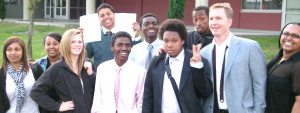7. Cognitive Underpinnings
“Cognitive underpinnings”: Bruner and Erickson, the Minds Behind the Method
Cognitive structure: Jerome Bruner
Jerome Bruner’swork provides much of the curricular framework for the Civics for All approach. This Harvard professor worked with JFK’s “best and brightest” and led the “cognitive revolution” of th1960s. His seminal 1960 book, The Process of Education, highlighted the necessity of the spiral curriculum, structure, and motives for learning:
- In the spiral curriculum students revisit the study of a subject at different grade levels and disciplines, each time at a higher level of difficulty and in greater depth. Bruner argued that : ‘A curriculum as it develops should revisit the basic ideas repeatedly, building upon them until the student has grasped the full formal apparatus that goes with them’ (ibid.: 13). The spiral curriculum provides the essential pedagogical structure and rationale for an integrated, K-12 curriculum which focuses on and deepens understanding of a few core principles, like citizenship, democracy, justice, etc.
- The role of structure in learning is fundamental to great teaching and learning. Bruner stated that: ‘The teaching and learning of structure, rather than simply the mastery of facts and techniques” is essential. (ibid.: 13). The study of complex notions like democracy, and attendant structures like the political spectrum, provide a framework for endless years of investigation and connections between all disciplines. See links on Proposal and Home pages for linking civics ideas to non-social studies disciplines in a structured fashion.
- Motives for learning. Bruner said that “Interest in the material to be learned is the best stimulus to learning, rather than such external goals as grades or later competitive advantage’ (ibid.: 14). In an age of increasing spectatorship, ‘motives for learning must be kept from going passive… they must be based as much as possible upon the arousal of interest in what there is be learned, and they must be kept broad and diverse in expression’ (ibid.:80).
Developmental psychology: Erik Erickson
Erik Erickson’s work provides much of the baseline developmental psychology framework for the Civics for All approach. His landmark model of the 8 stages of psychosocial development of humans provides crucial insight into effective educational practices. His work on the importance of affective learning has set the stage for today’s revitalized interest in the role of self-esteem and character development.
His work revealed:
- Civics provides students the opportunity and the motive to learn about themselves and “individuate” in his classic stage of “identity vs. role confusion.” A half century ago, Erikson noted “that political commitment and the acquisition of a political ideology were key indicators of identity formation and cognitive growth.”These findings align with and buttress Civics for All’s emphasis on using the political spectrum banners because they allow students to not only analyze the views of others, both historically and contemporaneously, but to develop their own views.
- Civics education sees learning as an evolving, humanistic process that involves teacher led elicitation of innate, intellectual, and emotional characteristics that make each of us unique.This process of individuation, or maturation, shapes and parallels the growth of students’ “civic identities.”
- This process of individuation (self-understanding – “Know thyself”) is essential in all cultures, but it is especially ingrained in the American academic and cultural tradition – our faith in the intrinsic value of the individual and of original thinking is one of America’s proudest, and most endangered, traditions. Well-realized students become well-realized citizens.
- “Individuation” and academic achievement is sparked when students personally encounter, analyze, evaluate, and synthesize the timeless; civic/ethic/political questions of humankind. As students’ civic identities evolve they come to see learning and citizenship as intimately interdependent and worthy of cultivation.
« 6. Common Core Alignment and National Civics Standards8. K-8 Civics and Connections to K-8 Social and Emotional Learning »





